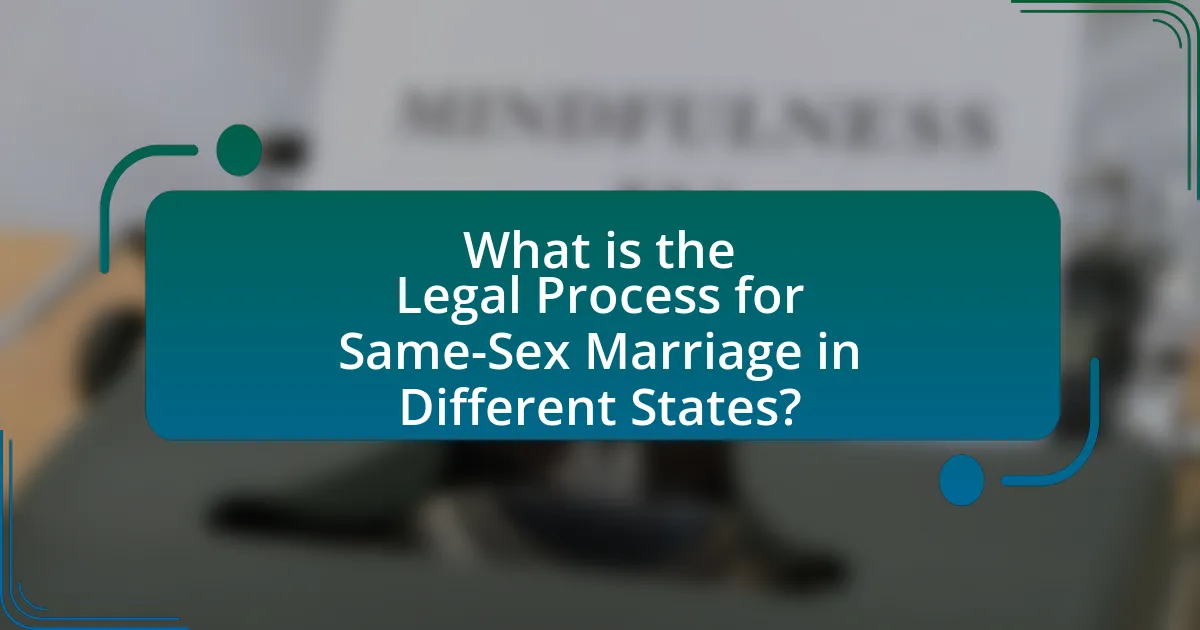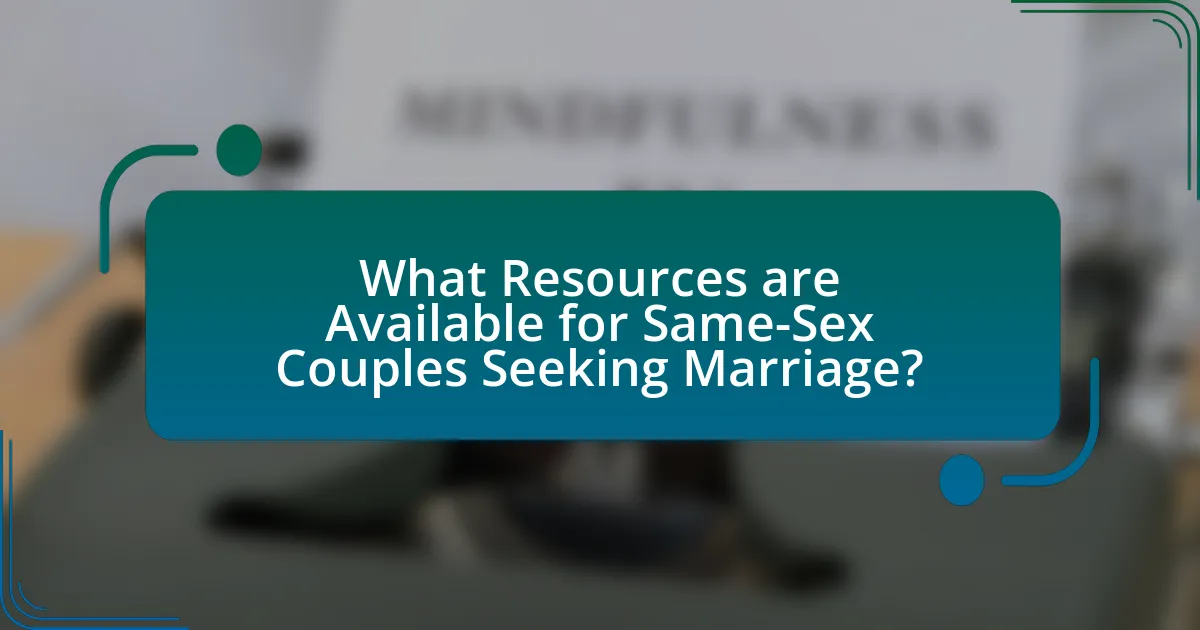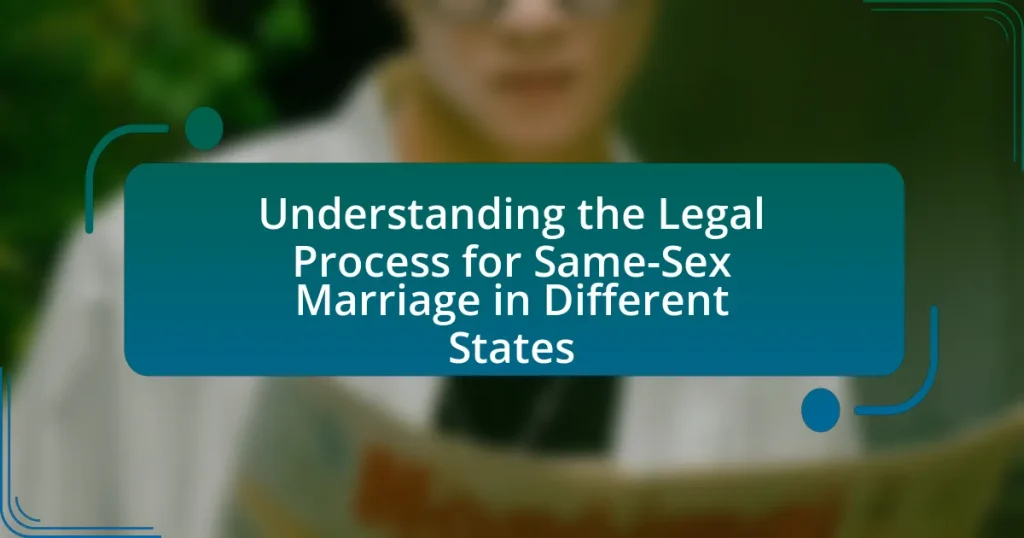The article focuses on the legal process for same-sex marriage across different states in the United States, detailing how state laws and federal rulings shape the marriage landscape. It outlines the evolution of same-sex marriage rights, highlighting key legal milestones such as Obergefell v. Hodges, which legalized same-sex marriage nationwide in 2015. The article also discusses the general requirements for obtaining a marriage license, the interaction between federal and state laws, and the implications of legalization for same-sex couples, including legal rights and benefits. Additionally, it addresses the challenges faced by couples in states with restrictive laws and provides resources for navigating the marriage process.

What is the Legal Process for Same-Sex Marriage in Different States?
The legal process for same-sex marriage varies by state, primarily influenced by state laws and federal rulings. Following the Supreme Court’s decision in Obergefell v. Hodges in 2015, same-sex marriage became legal nationwide, requiring states to issue marriage licenses to same-sex couples. However, the implementation of this ruling can differ; some states may have additional requirements or processes for obtaining a marriage license, such as residency requirements or waiting periods. For example, states like California and New York have streamlined processes, while others may have more complex regulations. The legal recognition of same-sex marriages is now uniform across the United States, but local administrative practices can still vary.
How has the legal landscape for same-sex marriage evolved over time?
The legal landscape for same-sex marriage has evolved significantly since the early 2000s, marked by a series of landmark court rulings and legislative changes. Initially, the first legal recognition of same-sex marriage occurred in Massachusetts in 2004, following a ruling by the Massachusetts Supreme Judicial Court, which declared that denying marriage to same-sex couples violated the state constitution. This set a precedent that influenced other states and led to a gradual shift in public opinion and legal frameworks.
In 2013, the U.S. Supreme Court’s decision in United States v. Windsor struck down the Defense of Marriage Act (DOMA), which had federally defined marriage as between one man and one woman, thereby granting federal recognition to same-sex marriages performed in states where they were legal. This ruling further propelled the movement for marriage equality across the nation.
The culmination of this evolution occurred in 2015 when the U.S. Supreme Court ruled in Obergefell v. Hodges that same-sex marriage is a constitutional right under the Fourteenth Amendment, effectively legalizing it nationwide. This decision invalidated state bans on same-sex marriage and mandated that all states recognize same-sex marriages performed in other jurisdictions.
As of 2023, same-sex marriage is recognized in all 50 states, reflecting a significant transformation in the legal landscape, driven by both judicial rulings and changing societal attitudes toward LGBTQ+ rights.
What key legal milestones have influenced same-sex marriage rights?
Key legal milestones that have influenced same-sex marriage rights include the 2003 Supreme Court case Lawrence v. Texas, which struck down sodomy laws and affirmed the rights of same-sex couples, and the 2015 case Obergefell v. Hodges, which legalized same-sex marriage nationwide. Lawrence v. Texas established a constitutional right to privacy for same-sex couples, while Obergefell v. Hodges ruled that same-sex marriage is a fundamental right protected by the Constitution, thus invalidating state bans on same-sex marriage. These cases collectively transformed the legal landscape for same-sex marriage in the United States.
How do federal and state laws interact regarding same-sex marriage?
Federal and state laws interact regarding same-sex marriage primarily through the principle of federalism, where both levels of government have the authority to legislate on marriage. The landmark Supreme Court case Obergefell v. Hodges (2015) established that same-sex marriage is a constitutional right under the Fourteenth Amendment, thereby requiring all states to recognize same-sex marriages performed in other jurisdictions. This ruling effectively invalidated state laws that prohibited same-sex marriage, creating a uniform standard across the country. However, states still retain the power to regulate marriage processes, such as licensing and ceremonies, as long as they do not violate federal constitutional protections.
What are the general requirements for same-sex marriage in the United States?
Same-sex marriage in the United States generally requires that both individuals be of legal age to marry, which is typically 18 years old, and that they are not closely related by blood. Additionally, couples must obtain a marriage license from the state in which they intend to marry, and they may need to fulfill specific state requirements such as waiting periods or providing identification. The landmark Supreme Court case Obergefell v. Hodges in 2015 established the constitutional right to same-sex marriage nationwide, affirming that states cannot deny marriage licenses to same-sex couples.
What documentation is typically needed to apply for a marriage license?
To apply for a marriage license, individuals typically need to provide valid identification, such as a driver’s license or passport, proof of residency, and, in some jurisdictions, a birth certificate. Additionally, many states require applicants to provide information regarding prior marriages, including divorce decrees if applicable. This documentation ensures that the applicants meet the legal requirements for marriage as stipulated by state laws.
Are there age or residency requirements for same-sex couples?
Yes, there are age and residency requirements for same-sex couples seeking marriage in many jurisdictions. Typically, most states require individuals to be at least 18 years old to marry, although some allow minors to marry with parental consent or judicial approval. Additionally, many states impose residency requirements, meaning that at least one partner must be a resident of the state where the marriage license is obtained. For example, in California, couples must apply for a marriage license in the county where one of them resides, and both must be at least 18 years old. These requirements can vary significantly by state, so it is essential for couples to check the specific laws in their state of residence.
How do different states approach same-sex marriage legality?
Different states in the U.S. approach same-sex marriage legality through a combination of legislative actions, court rulings, and voter referendums. For instance, states like Massachusetts and California legalized same-sex marriage through court decisions as early as 2004 and 2008, respectively, while others, such as Texas and Alabama, have enacted laws or constitutional amendments explicitly banning it. As of 2023, 36 states and the District of Columbia recognize same-sex marriage, reflecting a significant shift in public opinion and legal standards since the U.S. Supreme Court’s ruling in Obergefell v. Hodges in 2015, which established the constitutional right to marry for same-sex couples nationwide.
What states have legalized same-sex marriage, and what are their processes?
As of October 2023, all 50 states in the United States have legalized same-sex marriage, following the Supreme Court’s decision in Obergefell v. Hodges in June 2015, which ruled that same-sex marriage is a constitutional right under the Fourteenth Amendment. The processes for legalizing same-sex marriage varied by state prior to this ruling, with some states legalizing it through legislative action, others through court rulings, and some via ballot initiatives. For example, Massachusetts was the first state to legalize same-sex marriage in 2004 through a court ruling, while states like California and New York legalized it through legislative measures before the Supreme Court’s decision made it nationwide.
Which states have restrictions or bans on same-sex marriage?
As of October 2023, no states in the United States have restrictions or bans on same-sex marriage. The Supreme Court ruling in Obergefell v. Hodges in 2015 legalized same-sex marriage nationwide, invalidating state-level bans. This landmark decision established that same-sex couples have the constitutional right to marry, thus eliminating any existing restrictions or bans across all states.

What are the Implications of Same-Sex Marriage Legalization?
The implications of same-sex marriage legalization include enhanced legal rights and protections for same-sex couples, such as access to marriage benefits, tax advantages, and inheritance rights. Legal recognition of same-sex marriage has been shown to improve mental health outcomes for LGBTQ+ individuals, as evidenced by a study published in the American Journal of Public Health, which found that states legalizing same-sex marriage experienced a significant decrease in suicide rates among LGBTQ+ youth. Furthermore, legalization fosters greater societal acceptance and reduces discrimination, contributing to a more inclusive environment.
How does legal recognition of same-sex marriage affect couples?
Legal recognition of same-sex marriage significantly enhances the legal rights and protections available to couples. This recognition allows same-sex couples to access benefits such as tax advantages, inheritance rights, and healthcare decision-making privileges that heterosexual couples have long enjoyed. For instance, a study by the Williams Institute found that legalizing same-sex marriage in the U.S. led to increased mental health and economic stability among same-sex couples, demonstrating the positive impact of legal recognition on their overall well-being.
What legal rights and benefits do same-sex couples gain through marriage?
Same-sex couples gain numerous legal rights and benefits through marriage, including tax benefits, inheritance rights, and access to spousal health insurance. These rights ensure that same-sex couples are treated equally under the law, similar to heterosexual couples. For instance, married same-sex couples can file joint tax returns, which can lead to significant tax savings. Additionally, they have the right to make medical decisions for their partner and are entitled to spousal benefits in areas such as Social Security and pension plans. The U.S. Supreme Court’s decision in Obergefell v. Hodges (2015) legalized same-sex marriage nationwide, affirming these rights and benefits as essential to the dignity and equality of same-sex couples.
How does marriage impact issues like adoption and healthcare for same-sex couples?
Marriage significantly enhances the ability of same-sex couples to adopt children and access healthcare benefits. Legal marriage provides same-sex couples with the same parental rights as heterosexual couples, facilitating adoption processes by allowing them to be recognized as legal parents. For instance, many states have laws that prioritize married couples in adoption scenarios, which can lead to a smoother and more favorable adoption experience for married same-sex couples compared to their unmarried counterparts.
In terms of healthcare, marriage grants same-sex couples access to spousal benefits, including health insurance coverage and medical decision-making rights. This is particularly important in emergencies, where a spouse can make critical healthcare decisions on behalf of their partner. The 2015 Supreme Court ruling in Obergefell v. Hodges established marriage equality nationwide, ensuring that same-sex couples can enjoy these legal protections and benefits, which were previously unavailable or inconsistent across states.
What challenges do same-sex couples face in states with restrictive laws?
Same-sex couples in states with restrictive laws face significant challenges, including limited legal recognition of their relationships, lack of access to marriage licenses, and discrimination in various aspects of life. These restrictions can lead to difficulties in areas such as healthcare, inheritance rights, and adoption processes. For instance, a 2021 report by the Movement Advancement Project highlighted that 29 states have no laws protecting LGBTQ+ individuals from discrimination in employment, housing, and public accommodations, exacerbating the challenges faced by same-sex couples. Additionally, restrictive laws can create barriers to accessing benefits that heterosexual couples take for granted, such as tax benefits and spousal rights in medical decisions.
What legal recourse is available for couples facing discrimination?
Couples facing discrimination have several legal recourses available, including filing complaints with government agencies, pursuing lawsuits under anti-discrimination laws, and seeking assistance from advocacy organizations. For instance, the Equal Employment Opportunity Commission (EEOC) allows individuals to file complaints regarding workplace discrimination based on sexual orientation or gender identity. Additionally, many states have their own anti-discrimination laws that provide avenues for legal action. The landmark Supreme Court case Obergefell v. Hodges (2015) established the constitutional right to same-sex marriage, reinforcing protections against discrimination based on sexual orientation. These legal frameworks empower couples to challenge discriminatory practices effectively.
How can advocacy groups assist same-sex couples in navigating legal challenges?
Advocacy groups assist same-sex couples in navigating legal challenges by providing legal resources, education, and support tailored to their specific needs. These organizations often offer legal clinics, where couples can receive free or low-cost legal advice on issues such as marriage rights, adoption, and discrimination. For instance, the Human Rights Campaign has been instrumental in educating same-sex couples about their rights and available legal protections across different states, especially in areas where laws may vary significantly. Additionally, advocacy groups may engage in lobbying efforts to influence legislation that affects same-sex marriage and family rights, thereby creating a more supportive legal environment.

What Resources are Available for Same-Sex Couples Seeking Marriage?
Same-sex couples seeking marriage can access various resources, including legal organizations, online platforms, and state-specific guidelines. Organizations such as the Human Rights Campaign and Lambda Legal provide comprehensive information on marriage laws, legal rights, and advocacy for LGBTQ+ individuals. Additionally, websites like Marriage Equality USA offer state-by-state resources that detail the legal requirements for marriage, including necessary documentation and application processes. These resources are crucial for navigating the legal landscape, as marriage equality was established nationwide in 2015 through the Supreme Court ruling in Obergefell v. Hodges, which affirmed the right to marry for same-sex couples.
Where can couples find information on marriage laws in their state?
Couples can find information on marriage laws in their state by visiting the official state government website or the state’s department of vital records. These resources typically provide comprehensive details on marriage requirements, including age restrictions, licensing procedures, and any specific laws related to same-sex marriage. For example, the National Association of Secretaries of State offers a directory of state websites where couples can access accurate and up-to-date legal information regarding marriage.
What online resources provide updates on same-sex marriage legislation?
Online resources that provide updates on same-sex marriage legislation include the Human Rights Campaign, which offers comprehensive information on state laws and legislative changes, and the American Civil Liberties Union, which tracks legal developments and advocacy efforts. Additionally, websites like Pew Research Center provide data and analysis on public opinion and legal trends regarding same-sex marriage. These resources are reliable as they are maintained by established organizations focused on civil rights and legal advocacy.
How can legal professionals assist same-sex couples in the marriage process?
Legal professionals can assist same-sex couples in the marriage process by providing guidance on the legal requirements and documentation needed to obtain a marriage license. They can help navigate state-specific laws, which vary significantly regarding same-sex marriage, ensuring compliance with local regulations. For instance, legal professionals can inform couples about residency requirements, waiting periods, and any necessary identification or paperwork, such as proof of identity and prior divorce decrees if applicable. Additionally, they can offer advice on legal protections and rights associated with marriage, including issues related to adoption, inheritance, and healthcare decisions, thereby ensuring that couples are fully informed of their legal standing and benefits.
What best practices should same-sex couples follow when planning to marry?
Same-sex couples should ensure they understand the legal requirements for marriage in their state, as laws vary significantly across jurisdictions. Research indicates that some states may have specific documentation or residency requirements, which can affect the marriage process. Couples should also consider consulting with a legal expert who specializes in family law to navigate any potential legal complexities, such as name changes or adoption rights. Additionally, it is advisable for couples to discuss their financial and estate planning needs, as marriage can impact taxes, benefits, and inheritance rights. Understanding these aspects can help same-sex couples make informed decisions and ensure a smooth marriage process.
How can couples prepare for potential legal hurdles in their state?
Couples can prepare for potential legal hurdles in their state by researching state-specific marriage laws and consulting with a legal expert. Understanding the legal landscape, including any recent changes or pending legislation regarding same-sex marriage, is crucial for informed decision-making. For instance, states like Texas and Florida have faced legal challenges that could affect marriage rights, highlighting the importance of staying updated on local legal developments. Additionally, couples should consider drafting legal documents such as wills, powers of attorney, and healthcare proxies to ensure their rights are protected in various scenarios.
What steps can couples take to ensure their marriage is recognized across state lines?
Couples can ensure their marriage is recognized across state lines by obtaining a marriage license in a state that legally recognizes their union and ensuring that the marriage complies with the laws of that state. This is crucial because the U.S. Supreme Court ruling in Obergefell v. Hodges (2015) established that same-sex marriage is a constitutional right, requiring all states to recognize marriages performed in other states. Additionally, couples should keep copies of their marriage certificate and any relevant legal documents to present if needed in states that may have different laws regarding marriage recognition.


